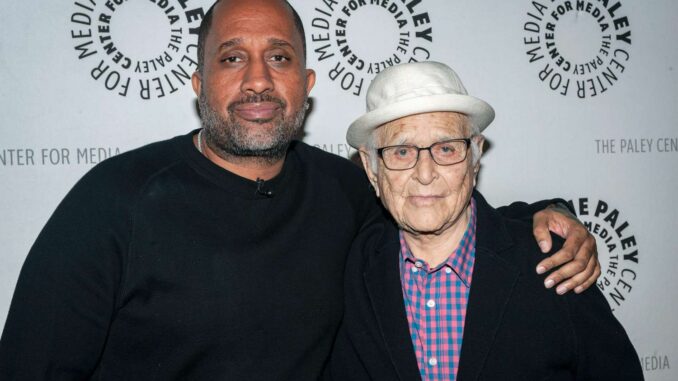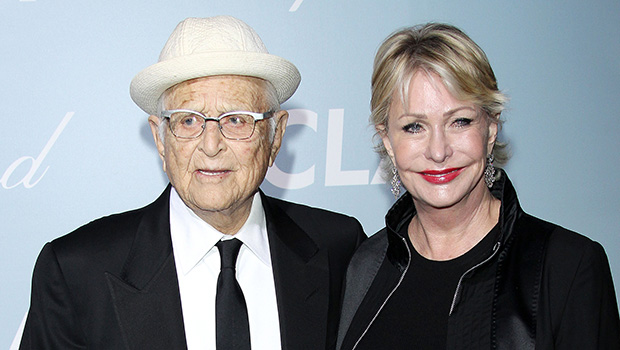
For more from Norman Lear and Kenya Barris, pick up Entertainment Weekly‘s Untold Stories issue on stands today, or buy it right here. Don’t forget to subscribe for more exclusive interviews and photos, only in EW.

The provocative mind behind All in the Family, Good Times, The Jeffersons, and many more sits down with his friend and heir apparent, the creator of black-ish, to reveal the surprising aspects of his glorious seven-decade-long run — from working in a manure factory to nearly casting Mickey Rooney as Archie Bunker.
The walls of Kenya Barris’ Burbank office are lined with framed script pages from pieces by his favorite screenwriters. Among them are Woody Allen, Spike Lee, and, of course, Norman Lear, the man —with his indelible hits, including Good Times, All in the Family, and The Jeffersons — Barris credits with shaping his approach to the modern network sitcom. The two met years ago, and that encounter quickly blossomed into a friendship. Lear even visited the writer’s room on season 1 of black-ish and pitched a couple of ideas. Now this odd couple has reunited for an interview in which Barris, 43, gets to ask Lear, 94, everything he’s ever wanted to know about the icon.

KENYA BARRIS: At the height of your career, you had The Jeffersons, All in the Family, Good Times, Maude, and One Day at a Time all on TV. You managed to write about seemingly every different kind of person. And you told me a story about how when you would ride the train from Brooklyn into the city, you’d look at the housing tenements, and you’d think about who lived there. When you started writing professionally, had your life become a life in which you actually knew these kind of people? Or did you [just] envision these people?
NORMAN LEAR: I didn’t have relationships, but I had the affection for and the appreciation of. I [was a pilot] in WWII, and we were stationed at Avon Park, Florida. We were living in a ballpark while we waited for the B-17 to fly us overseas. I was bored to tears. I saw an ad to work in a manure factory. I was the only white guy there. Everybody was black. There was a giant wood wheelbarrow. They dumped manure into it, and I took it down this track and dumped it out, and then it came back on another track. There was one black guy who was coming up as I was going down, and every time he saw me, he said, “Gator gonna get you, white boy.” That was like a love letter, every time. And some of that traveled with me, you know. I never lost that feeling of shared humanity.:max_bytes(150000):strip_icc():focal(733x359:735x361)/lyn-lear-norman-lear-120723-1-fa15d2595fe04c3183d07ab31a711d57.jpg)
BARRIS: Yes, shared humanity is a common theme on your shows. Who was your toughest character to cast?
LEAR: I’ve been really lucky. I’m in awe of what an actor can do with a role. When I wrote Archie Bunker, I didn’t have Carroll O’Connor in mind. An actor had to walk in and sit down and show me what I had in mind.
BARRIS: When did you know you wanted him?
LEAR: The minute he uttered the first line. I had seen 30 to 40 people in the East, and I came out West to read actors. I probably saw a dozen before he came in and sat down. He wasn’t off the first page before I knew.
BARRIS: So if for some reason the business of it couldn’t happen, can you remember who would have been Archie Bunker?
LEAR: No, I wasn’t close. Here’s how far away I was: Before I came out here and met Carroll, I thought about Mickey Rooney playing the role.
BARRIS: What?! Oh my God!
LEAR: I called his manager, and he said, “Oh, Mickey happens to be in the office. Why don’t you talk to him!” And I said, “No, no, this is a character I would rather talk to him about and then have him read,” and he said, “No, no, no.” Anyway, before I know it, Mickey [was on the phone] talking about himself in the third person. “You got the Mick!” “Mickey is gonna be out there, can I see you out there? I’ll be out there Tuesday.” “You got something for the Mick, just tell him!” I said, “Well, he’s a bigot, he’ll say spics and spades and hebes” — and he said, “Norm, they’re gonna kill you. They’re gonna shoot you dead in the streets.” I can never forget this speech. “You wanna do something with the Mick? Listen to this: Vietnam vet. Private eye. Short. Blind. Large dog.”
